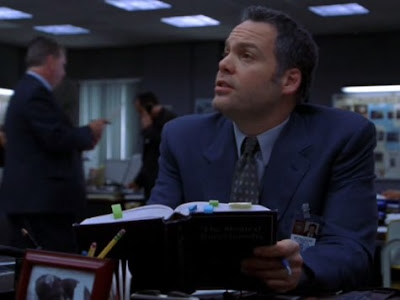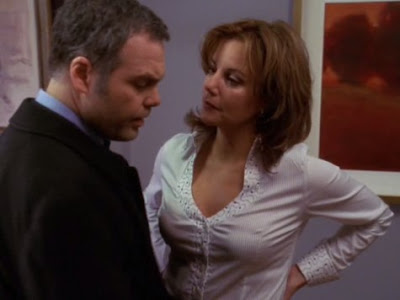Robert Goren: It's a homeopathic remedy for cat allergies. Microscopic cat dander you put on your tongue. I had a girlfriend named Lola, she had cats.

Woofy... Woofy! Where's My Derin Mommy?

Woofy... Woofy! Where's My Derin Mommy?
 Tell Me, Do I Look Like A Freakin' People Person?
Tell Me, Do I Look Like A Freakin' People Person?

 So Many Stupid People And So Few Asteroids!
So Many Stupid People And So Few Asteroids! 
.jpg)






Allright Eames! You Win, I Give Up.
But Can You Say Pseudohypoparathyroidism?

As we all know; Anti-Thesis is the second episode of LOCI in which for the first time, famous archnemesis of our detective, Nicole Wallace/Professor Elizabeth Hitchens appears. According to Wikipedia, Harvard University's undergraduate student newspaper, The Harvard Crimson, suggested in October 2002 that the episode's premise was lifted from the nationally-publicized, real-life squabble between Harvard University president Lawrance Summers and African-American Studies Professor Cornel West. In real life, West wears an afro haircut and goatee, teaches American Studies and was criticized by Harvard University president for releasing a rap album. Like West, the fictional Professor Roland Sanders of the history wears an afro haircut and goatee, teaches American Studies and is criticized by fictional President Winthrop for releasing an album.

That Big Detective Is Smart!


The Pilgrim (S02E08)
The Faithful (S01E04)
Badge (S01E20)
Baggage (S02E11)



But above all, I love this episode most just because my 'good old fashioned common sense' tells me that war is not the answer, it never solves anything, never did never will. Democracy doesn’t come from the end of a gun. War no matter where/what/who, it is a total waste of lives and money. So far as it's concerned it's utterly and completely immoral. It’s time for all nations and all people of this planet to put down their arms, once and for all. This is not a pipe dream, it's the only way, especially these days.

Bobby, Touching Van Gogh's Self-portrait With Bandaged Ear

And btw dear Bobby, despite common beliefs Van Gogh did not cut off his whole ear but only cut off the lobe of his left ear:) Anyway as I've mentioned, in this episode, our detective is after an ophthalmologist with Schizophrenia and a keen interest in Van Gogh, who believes that his disorder is not seated in the brain but in the optical nerves. On that account we see The Starry Night, believed to be Van Gogh's masterpiece, on the wall of the doctor's office. Well, as I have never got tired of listening to Vincent, an excellent song by Don McLean written as a tribute to Van Gogh (also known by its opening Starry Starry Night) for some reason, Starry Night has a special place in my heart. For those who are interested; The Starry Night is still being exhibited at MoMA (special exhibition gallery on the second floor) in NY. Since Van Gogh and the Colors of the Night is scheduled to be shown from September 21, 2008 to January 5, 2009 the exhibition will officially end tomorrow.

The Starry Night (De Sterrennacht in Dutch) 1889

In episode Inert Dwarf (S04E09) we learn that Bobby read the book of John Minotti, a cranky mathemathics genius (real-life Stephen Hawking presumably). But he humbly admits that he fails to understand his universe. I've read S. Hawking's four books of which three of them were quite incomprehensive. The one I've managed to understand was his autobiography:) No seriously, I'm very much interested in String Theory. Below, Bobby is reading a big, black textbook titled A Study in Psychopathology (Consumed S03E21). I exactly had the same one marked with lots of post-its while I was studying for my TUS (academic equivalent of USMLE).

With so many books in your hand, now you've decided to have a Ph.D. degree Bobby? (Eosphoros S04E05). Think again! Well yes, you can but that doesn't mean that you should:) Aaah, if you should have only seen me presenting my proposal to the doctoral committee after the Ph.D dissertation!


Or maybe you have decided to become a master of wine? Anyway most Oenologists hold doctorates. You are circling around that Ph.D. stuff, I guess.

Since there's noone to interrogate, Bobby spends his time concentrating on Riemann Hypothesis (Bright Boy S02E02). Even tired he looks perfect, doesn't he?

In btw have you noticed? By detecting several physical symptoms our detective is capable of identifying complex diseases; such as Spina Bifida (Wrongful Life), Cannibalism (Want), Partial Epilectic Seizure (The Gift), Dyslexia (Bright Boy), Voyeurism (Zoonotic), Aspargar Syndrome (Probability), Schziphorenia (See Me) (Gemini), Diabetes Mellitus (Cherry Red), Alzheimer Disease (Cold Comfort) (In The Dark), Stockholm Syndrome (Homo Homini Lupus) (Prisoner), Borderline Personality Disorder (Shrink-Wrapped) (Semi-Detached), Paranoid Personality Disorder (Scared Crazy) (Cuba Libre), Psychopathic Personality Disorder (Blink), Nyctalopia (See Me), Migraine (Suite Sorrow), Passive Agressive Personality Disorder (Best Defense), Somnambulism (Consumed), AMD-Macular Degeneration- (Amends), Anaphylaxis-Catastrophic Allergic Shock- (Sound Bodies), Incestism (Death Roe) and Autoerotic Asphyxiation (Tomorrow). D-e-f-i-n-i-t-e-l-y Goren Knows Everything. Um... Btw why do I get the feeling that in almost everyway, you and me, we are supposed to be together? But I guess I will never know how it feels to be with you *a big, heavy, long sigh*. So what? That's no matter for wishful thinking:) What better place to dream than in NY anyway? Although a little, cute mouse thinks otherwise.


Having Fun In A Confined Place (Tuxedo Hill S01E22)

Ronald Searle's Cats
Contrary to what I've written above I still love the things that people of my age have grown out of, such as unicorns, cunning elves, crystal balls. Other than my personal interest, fairy tales play an important role in dynamic psychology and the history of psychoanalytic interpretations of fairy tales goes back to the times of Sigmund Freud. Freud in his 1919 essay The Uncanny, not only a theoretical commentary on the power of strangeness but one of the weirdest texts in the Freudian canon, draws on the work of German fairy tale writer E.T.A Hoffmann and focuses specifically on his tale The Sandman featuring a doll named Olympia. Besides not long ago, I remember reading an article titled Fairy Tales and Trauma in American Journal Of Psychoanalysis; an international quarterly founded by Karen Horney (a pioneer scholar in the field). Anyway, let's check the pic below. It looks Bobby's found his magic peas (Tomorrow - S02E07). So is trick about to happen? Mirror, mirror on the wall; tell me can a fiction man turn into a real life man after midnight? If you believe pigs can fly, why not? According to New Scientist; over the past couple of years, neuroscientists and magicians have been getting together to create a science that might be called 'Magicology'. If succesful, both sides stand to benefit. After all magic is all about appearing to break the laws of nature. And the laws of nature, of course inviolable, which is why magicians target the human brain instead. Btw as a current subscriber, this magazine is amazing, for instance, let me write some titles from the latest one: 'All I Want For Xmas Is A Snowflake Machine' or 'Do Polar Bears Get Lonely?' Pretty smart, pretty cute:)

Bobby, Making Magic (Crazy S01E12)

A Psychiatrist Hitting On Bobby (Shrink Wrapped - S03E15)
Ah, you are a shrink-magnet, aren't you? Humpf! I'm nothing like her, besides my handwriting is readable:) In btw, I've noticed that whenever a woman tries to seduce Goren, he immediately pulls back, as in this episode (Shrink Wrapped - S03E15). For instance, in another episode, when a woman touches Goren's coat to dust off, he suprises (Maledictus - S01E19). In A Person Of Interest (S02E23) when Nicole Wallace stands up to Goren both verbally and physically, he again steps back. Also in Vacancy (S05E17) when an out-of-towner girl treats Goren as her 'guardian angel', he seems quite embarrased. And about that MD issue; Oh yes, we're here, there, everywhere. Beware! We reproduce by dividing. We are pros, we know what we're doing. We plan, we wait in the dark, we never sleep. When the right time comes, we'll sneakly attack. Before long, we're gonna invade the entire world and then our kingdom will come. Yet still in spare time we save lives. No, I'm just kidding. No hard feelings. All the scriptwriters, please know that you're doing a great job. There it's; Bobby in white coat (Prisoner - S05E03).

